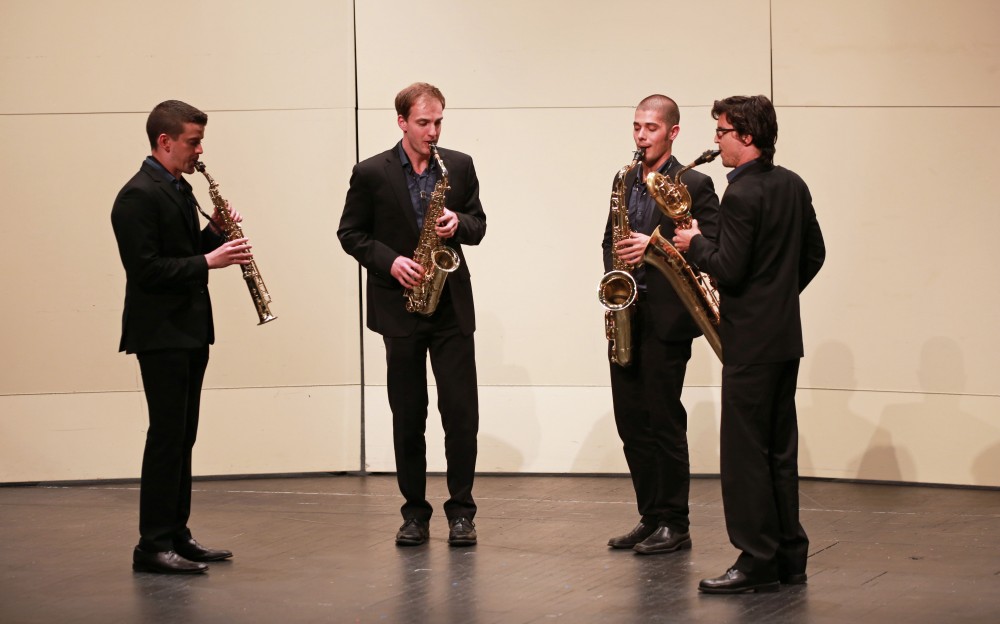Donald Sinta Quartet shows off saxophone at Faculty Concert

GVL / Kevin Sielaff The Donald Sinta Quartet performs on stage. The GVSU music department presents a faculty concert as a part of Fall Art Celebration Sept. 21 in the Louis Armstrong Theatre.
Sep 28, 2015
Featuring members of the Grand Rapids Symphony Orchestra, a professor’s original composition and a professor performing with his saxophone quartet, the Fall Arts Celebration continued with a concert put on by some of Grand Valley State University’s music department faculty.
The concert opened with a performance by a flute, horn and piano trio displaying GVSU’s partnership with the GRSO and new piano instructor Sookkyung Cho. The trio was followed by a performance of associate professor Bill Ryan’s composition “Simple Lines” played by associate professor Pablo Mahave-Veglia. Closing off the concert was assistant professor Dan Graser’s saxophone quartet the Donald Sinta Quartet.
“Each of the performers are all recognized artists,” said Frederick Antczak, dean of the College of Liberal Arts and Sciences. “They are all in demand not only in our region and nationally, but it’s always a point of pride and the best kind of surprise that we can feature them here in this artistic setting that has made Grand Valley such a great place to perform and to study music.”
While the concert highlighted the abilities of faculty members, the Donald Sinta Quartet highlighted the abilities of the saxophone. Formed in 2010, the quartet was the first saxophone quartet to win first prize in the Concert Artists Guild International Competition in New York City as well as the Alice Coleman Grand Prize at the 2013 Coleman International Competition in Los Angeles.
“A saxophone quartet is uncommon in these sorts of series,” Graser said. “When people see saxophone quartet on a concert set they’re still wondering exactly what they’re going to hear. It’s not on most people’s radar as a classical instrument.”
The quartet played pieces ranging from modern saxophone repertoire, to classical composer Antonin Dvorak, to the band Radiohead, to a traditional Irish fiddle tune.
“I just wanted to show people what saxophone can do,” Graser said. “It’s an instrument that’s extremely chameleon-like: it can sound like a great chamber ensemble, it can sound like a string quartet in some parts and sound like an organ in another part. It can sound like a choir. It can sound extremely soft and controlled and it can be the most brash instrument you’ve ever heard.”
One of the challenges for playing classical music on the saxophone is living up to the high standards, Graser said. He said that when he plays classical music, he hopes to show that the saxophone is capable of playing classical music well.
“For music that has such a long history, there’s an extremely high standard because it’s been recorded by the best chamber ensembles that have walked the face of the earth,” Graser said. “The challenges of playing mainstream classical repertoire on the saxophone is that you live up to that.”
For cellist Kevin Flynn, the Donald Sinta Quartet was able to show the saxophone living up to that high standard.
“Typically when saxophones steal music I feel betrayed or somehow cheated,” Flynn said. “But when (the Donald Sinta Quartet) steal music I feel validated because they bring to the table a serious respect for the music and the bulletproof chops to make it as faithful and as individual as possible.”
Sophomore saxophone student Darwin McMurray said that for him the concert inspired him to practice more to be able to someday play as well as the Donald Sinta Quartet.
“I hope to be able to play to be able to play those pieces someday,” McMurray said. “I hope to do exactly what my saxophone professor (Graser) is doing now, become a saxophone professor, perform and teach and kind of make a new life for the saxophone and show that it is a great instrument.”
Graser said he hopes the concert gave his students the opportunity to hear him play and show that he does practice and perform as much as he teaches them to in their lessons.
“We emphasize over and over again that if you want to be a great teacher, you have to be a great player, you have to be a great musician,” Graser said. “And it’s enough to say it, but you also have to demonstrate that. We have some really world-class faculty here that are doing some really interesting things.”






















